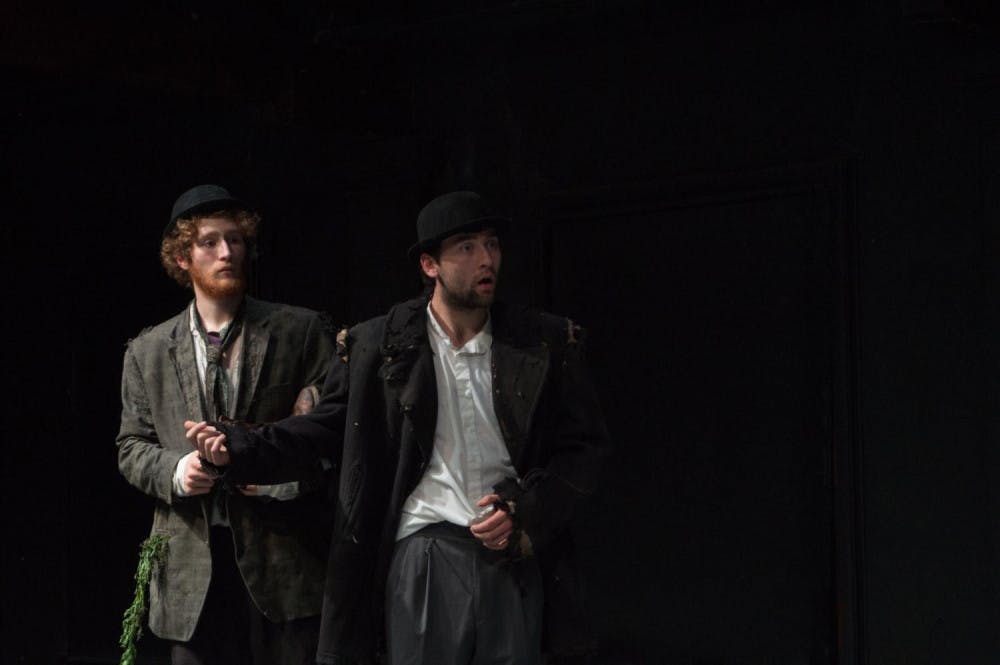Samuel Beckett’s absurdist tragicomedy “Waiting for Godot” is a notoriously difficult piece, and a group of students took on the challenge.
The show follows two men, Vladimir (Jackson Prince ’17) and Estragon (Kean Haunt ’17), as they wait for a man named Godot, who never comes. They consider leaving their spot — an unspecified place by a country road — but never do. They encounter three other characters — Pozzo (Kevin Commins ’76), Lucky (Kevin Benscheidt ’18.5), and an unnamed boy (Zach Jette) — with whom they try to relate to despite their poor memories and dissociative tendencies. Little develops. The comedy is unconventional and the tragedy, if performed without proper timing and energy, can be hard to grasp.
But the cast of “Waiting for Godot,” who performed from May 4 to May 6 in the Hepburn Zoo, mastered the play’s essential rhythms. The long silences and short, snappy dialogue felt percussive, like the rests and beats of a musical composition. This timing made the play’s essential repetitiveness more obvious — and consequently, more devastating.
Director Sally Seitz ’17 credited the actors for this success. “To create those canters it takes a great deal of listening, an awareness of how words sound, and how those sounds play off one another,” she said.
The physical comedy, too, felt set to a metronome: when Estragon opened the show with an elaborate attempt to take off his boot, he set a lively pulse that the other actors maintained. When Pozzo abused his leash-led slave, Lucky, the choreography could easily have grown chaotic, but instead it seemed practiced and measured, as it should have been, given their repetitious world.
“The music of the play is quite palpable, and it’s really obvious when it’s wrong,” Haunt said. “Getting it right involved listening really intently to the other actors onstage to make sure we weren’t trampling over whatever was already in the room.”
And the plays musicality did more than simply emphasize repeated dialogue. It evoked the strange intangibility of memory. The show’s characters spent a lot of time trying to place themselves in space and time; they debated whether it was day or night, whether they did such-and-such activity yesterday or not, how long they had known each other or whether they had ever met at all. They attempted vainly to find a narrative in their own lives the same way we might try to recall a forgotten melody: we struggle for something cohesive but can only grasp bits and pieces.
Godot, of course, loomed over the piece as the only hope in a barren world. The set underscored this — only a tree and a rock furnished the stage. The two-limbed tree, painted white, was more a surrealist evocation of a tree, which was so feeble-looking. The rock sat squat on the grey floor. Costume designer Iram Asghar ’18 dressed Vladimir and Estragon in tattered jackets and bowler hats, like tramps. They looked weary, and the actors’ sweat added to the effect. Godot was their potential rescuer.
Seitz confirmed that she saw hope as the most important aspect of the play. “It prevents Didi [Vladimir] and Gogo [Estragon] from giving up,” she said. “As a cast, we sometimes lost sight of how important hope was, and I credit our advisor Cheryl Faraone for reminding us that to the characters in this play, ‘the glass has to be half-full.’ It’s a play about trying, and it’s a play about human perseverance even when the odds are against you.”
But Godot never arrives; the characters’ hopes are never realized. This is the tragedy that imbues the comedy, and vice-versa. A boy who works for Godot tells Vladimir that Godot will not come that night, and though Vladimir remembers the boy from the previous night, the boy denies having come before. Vladimir’s ultimate devastation is the audience’s devastation too. Prince’s performance conveyed this brilliantly: he showed the struggle that needed to be seen and to be remembered in the most subtle, human way. And when he and Estragon chose again to sit and wait on the rock, we understood the whole spectacle’s irony — how significant it is that the moonlight was really a spotlight — and we craved connection with the two lonely men as with others in our daily lives.




